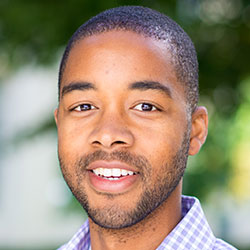Faculty DirectoryMarcelo Worsley

Karr Family Associate Professor of Computer Science
Associate Professor of Learning Sciences, School of Education and Social Policy
Contact
2120 Campus DriveAnnenberg Room 332
Evanston, IL 60208
Email Marcelo Worsley
Website
Departments
Education
Ph.D. Learning Sciences, Stanford University, Stanford, CA
M.S. Computer Science, Stanford University, Stanford, CA
B.S. Chemical Engineering, Stanford University, Stanford, CA
B.A. Portuguese Language and Literature, Stanford University, Stanford, CA
Biography
Marcelo Worsley is an Associate Professor in Computer Science and Learning Sciences. He directs the technological innovations for inclusive learning and teaching (tiilt) lab, which aims to develop pedagogical and technological solutions for supporting learning among diverse populations in hands-on, collaborative, environments. More specifically, the goal of his research is to promote equity and advance society's understanding of how students learn in complex learning environments by forging new opportunities for using multimodal technology. The use of multimodal technology is multi-fold. First, the environments that he studies allow students to experience learning across a range of modalities. Second, he uses multimodal signal processing and artificial intelligence to study how student learning is demonstrated across different modalities and time scales. Third, he designs multimodal interfaces that support inclusivity and deepen student learning, while also considering ways to use multimodal data to support student and teacher reflection.
Research Interests
Worsley's work examines technological innovations for supporting inclusive learning and teaching. Specifically he directs the tiilt (Technological Innovations for Inclusive Learning and Teaching) Lab. tiilt aims to improve learning opportunities for students from under-served communities. Our work with technological innovations includes: 1) co-designing activities with teachers and learners; 2) creating interfaces that broaden participation in meaningful learning experience; and 3) tools and analytic techniques for studying and supporting complex learning environments. We position our work as inclusive, in that we endeavor to address historic and contemporary disparities in accessibility, inclusivity and social, racial and economic inequity. Furthermore, we work with teachers, students, community members and parents, in hope of supporting the development of positive learning ecosystems.
Selected Publications
- Quiterio, Ashley; Kumar, Vishesh; Worsley, Marcelo, Data as an Actor in Collaborative Sensemaking, Association for Computing Machinery, Inc (2025).
- Bodon, Herminio; Kumar, Vishesh; Worsley, Marcelo, Design Principles for Authentically Embedding Computer Science in Sports, ACM Transactions on Computing Education (2025).
- Issa, Jannah; Kumar, Vishesh; Worsley, Marcelo, Spatial Cognition Through Gestural Interfaces, Springer Science and Business Media Deutschland GmbH (2024).
- Bodon, Herminio; Kumar, Vishesh; Worsley, Marcelo, Constructing Sports Technologies and Understandings, Association for Computing Machinery (2024).
- Quiterio, Ashley; Kumar, Vishesh; Worsley, Marcelo, When Athletes Play Around Technology - A Sporting Approach to Computing Inquiry, Association for Computing Machinery (2024).
- Lee, Sarah Priscilla; Nanoff, Tyler; Simmons, Sydney; Jones, Stephanie T.; Kumar, Vishesh; Worsley, Marcelo, Toward Co-Design with Refugee Youth, Association for Computing Machinery, Inc (2023).
- Kumar, Vishesh; Ali, Safinah; Worsley, Marcelo, PaintBall – Coding Sports Into Art for Cross-Interest Computational Connections, Association for Computing Machinery, Inc (2023).
- Lewis, Zoe; Lee, Sarah P.; Jones, Stephanie T.; Nanoff, Tyler; Worsley, Marcelo, For maker’s sake, Association for Computing Machinery, Inc (2023).